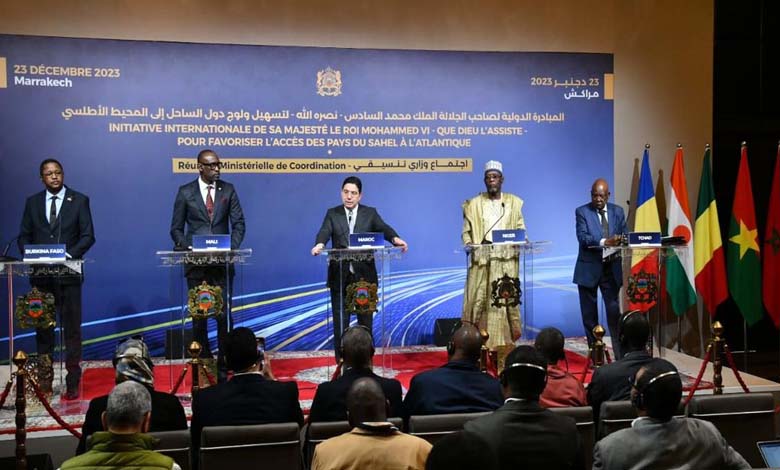The Atlantic Initiative Foils Polisario’s Bet on Instability Strengthening
Moroccan relations with Sahel countries raises Algerian displeasure, especially amid its tensions with Mali, angered by interference in its internal affairs

The Polisario Front, along with Algeria, views with concern and apprehension any Moroccan initiative or step towards enhancing security, economic, and developmental cooperation with African countries. This policy, pursued by Rabat, has been highlighted during international events and conferences aimed at attracting the necessary investments for comprehensive development on the continent, including the Atlantic Initiative.
The international initiative, launched by the Moroccan King Mohammed VI, aims to facilitate the access of Sahel countries to the Atlantic Ocean for a flourishing Africa. It provides unprecedented opportunities to enhance regional integration, cooperation, and structural transformation of the economies of Sahel countries. However, it has not been well-received by the separatist front, as it is seen as bolstering Morocco’s position and its relations with the African surroundings.
Mohammed Amin, the spokesperson for the “Polisario Embassy” in Algeria, criticized the initiative, considering it a “new attempt to target Algeria, selling illusions to African Sahel countries, and claiming that the Atlantic region is a war zone.” Algerian frustration with the initiative is evident, coinciding with escalating tensions with Mali, accusing Algerian authorities of interfering in its internal affairs.
Analyses suggest that the separatist front is betting on the precarious security situation in Sahel countries to facilitate funding for activities associated with organized crime, especially in the areas of arms trade, drug trafficking, and human trafficking. The initiative, however, has positive implications for the social situation of the region’s inhabitants and in the security aspect, promoting peace and stability, undermining the illegal activities of the Polisario.
The Atlantic Initiative received wide praise from the foreign ministers of Mali, Niger, Burkina Faso, and Chad, as it will contribute to the “launch of a new, strong, and bold Africa, capable of defending its interests and influencing the international stage,” according to analysts.
At the conference in Marrakech held last Saturday, December 23rd, an agreement was signed between Sahel countries and Morocco, representing an initial step towards implementing the initiative. Ministers representing Burkina Faso, Mali, Niger, and Chad reaffirmed their commitment to the royal initiative launched by King Mohammed VI to facilitate Sahel countries’ access to the Atlantic Ocean.
Sahel African countries agreed to establish a national working group in each country to develop and propose ways to activate the initiative for the benefit of Sahel countries. They emphasized the strategic importance of this initiative, providing significant opportunities for the economic transformation of the entire region, accelerating regional communication, trade flows, and shared prosperity in the Sahel region.
Nasser Bourita, the Moroccan Foreign Minister, stated on the sidelines of the meeting that “launching this initiative is linked to strengthening cooperation.” Bourita pointed out that the challenges facing Sahel countries concern his country due to geographical proximity. He recalled his country’s previous decisions regarding African Sahel countries, such as debt cancellation and tariff reductions, affirming that the challenges facing the Sahel are challenges for Morocco as well.
He emphasized that students from these countries benefit the most from training in Moroccan institutions, calling for the necessity of “looking at opportunities, potentials, and solutions in Sahel countries, as development offers a solution to many challenges facing African Sahel countries.” He pledged to provide his country’s resources to “support Sahel countries in raising their growth rates.”
The geography of the African Sahel region extends north to the border of the Sahara Desert and south to the beginnings of the green savannah region. The Sahel includes ten countries, but the reference to the Sahel region usually focuses on six main countries: Senegal, Mali, Niger, Chad, Burkina Faso, and Mauritania.
Among these six countries, all are landlocked except Senegal and Mauritania. For example, Chad is more than three thousand kilometers away from the Atlantic Ocean coast, and Niger is separated from the coast by a distance exceeding a thousand kilometers. Thus, none of these countries fall entirely within the Sahel region, as its widest parts extend into Niger and Mali. This underscores the significance of the Moroccan initiative including only these four countries in the Sahel region.
In November of last year, King Mohammed VI called for enabling the group of African Sahel countries to access the Atlantic Ocean for their benefit, considering that the success of this initiative depends on rehabilitating the infrastructure for Sahel countries and connecting them to transport and communication networks in their regional surroundings. The King, in a speech delivered on his behalf by his advisor Omar Kabbaj, the honorary president of the African Development Bank, stated that “Africa now more than ever needs bold and innovative initiatives to encourage private entrepreneurship and unleash its full potential for our continent.”
He mentioned that Morocco could be a model for the efforts of other African countries to overcome their infrastructure gaps, stating that “over the past two decades, Morocco has made the development of infrastructure a priority in all economic sectors.”
In the city of Dakhla, located on the maritime border with Mauritania, Morocco has established one of the largest ports on the Atlantic Ocean coast. Since Mauritania is one of the Sahel countries, Morocco has sought to provide this port, which is a crucial part of Moroccan infrastructure, as an access point for Sahel and desert countries. This measure aims to alleviate the geographical isolation experienced by Sahel countries that do not have a coastline, providing them with an outlet on the Atlantic Ocean for direct connection to the Americas and other major global economies.












